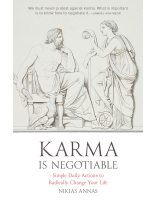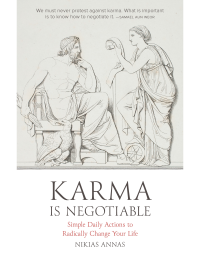If karma did not exist, there would be no free will. Yet, if there were no consequences for our actions, all of us would be forever enslaved by the tyranny of a powerful oppressor who never had to answer for his crimes. Fortunately, cause and effect does exist, and every action bears a consequence for its originator. Furthermore, once the consequence is complete, the debt is paid. No suffering lasts forever.
The law of karma is not “out to get you.” Law without mercy is tyranny, and the Divine is not cruel and unjust. The Divine is pure love and wisdom. How could the Divine wish you to be eternally in suffering? Hell, suffering, exists as long as there are debts to be paid. When the debt is paid, the suffering ends.
Therefore, no matter your situation or how grave your suffering, there is a way to resolve it. The power to change our karma begins within us.
Every religion in the world began by instructing its students in ethics, not morality. Nowadays most religious systems have become mere morality or philosophy. Yet true ethics are not “morals.”
Morals change with time and with culture. Behaviors that are moral in North America are immoral in Asia. Behaviors that are moral in Asia are immoral in the west. Thus, morality is subjective. Morality is not eternal, immutable, and infallible. Morality changes with time and culture.
Ethics, on the other hand, are eternal. True ethics—conscious ethics—are laws of nature. Religions originally emerged from cognizant knowledge of those ethical laws, even if later the religions degenerated and collapsed into moral dogmas.
In Judeo-Christian traditions, ethics were synthesized in the Decalogue, the Ten Commandments. These are ethics formulated as “Thou shalt not kill,” “Thou shalt not covet,” “Thou shalt not commit adultery, fornication,” “Thou shalt honor thy father and mother,” etc. All of the commandments have an ethical foundation. The Ten Commandments are not the only representation of ethics in the Jewish or Christian traditions, they are just a simplified synthesis of them.
In Hinduism there are many presentations of ethics. Probably the most famous is in Patanjali’s Yoga Sutras, which is an exposition of Raja Yoga. The first two steps of Raja Yoga are Yama and Niyama, which are ethics and observances, and refer to what you should do and what you should not do.
Buddhism, Islam, and every other spiritual tradition present a wide range of ethical instruction, but unfortunately, nowadays people ignore the ethical guidelines, or merely respect them but do not attempt to apply them, or they interpret the instructions very literally, and allow themselves lots of loopholes, especially among the so-called elite, such as priests and students of esoteric instructions, who believe they have transcended the “basic” stages of their traditions. This is why we can find so much mistaken behavior in followers of every religion, even to the point that people kill, rape, steal, and lie, all the while claiming to be “religious.”
In general, followers of religions lack understanding of why ethics are important.
Ethics are not just mechanical laws that some external authority is trying to impose upon us. The ethical rules, commandments, or vows have a very specific function, which must be clearly grasped, and that is this: If you perform actions that are harmful, you create disharmony not only in your environment but in your mind.
Someone who steals creates disharmony in their mind. They become addicted to the excitement of the act. They become addicted to the fear of being caught. They lose respect for others and themselves. They cease to care about other people, and only see others as targets to steal from. They even begin to hate others, and want to steal in order to punish them. Thieves become liars to themselves and to others. All of this causes the mind to be disturbed.
The same happens with all actions that contradict ethical behavior.
Yet if you follow the “observances,” or positive behaviors, you create positive energy, not only into your environment, but in your mind. The purpose of Raja Yoga’s stages of Yama and Niyama or the Commandments of Moses is to stabilize our psyche so that we are no longer vibrating with so much negative emotion. For example, any Buddhist, whether a lay person or an ordained monk, always takes five fundamental vows:
- to not steal
- to not kill
- to not lie
- to not commit sexual crime
- to take no intoxicants
Each of these are broader than they first appear.
Each of these actions creates a great energetic disturbance in the mind and environment. These types of energetic disturbances prevent quietude and peace of mind. They disturb the consciousness, and trap it in harmful qualities. In such psychological circumstances, it becomes impossible to experience your true nature, the free consciousness. Consciousness intoxicated with alcohol or drugs can only perceive through the influence of those chemicals, thus it cannot see reality clearly. Someone who lies is influenced by the energetic consequences of the lie, they obscure the truth from others, and cannot see the truth themselves. Each of these actions creates powerful energetic disturbances.
If you observe yourself, you can see how true this is. When a strong negative emotion like anger or lust takes a hold of you, you cannot relax, you do not have a calm mind; you are very agitated. That agitation is precisely what prevents us from seeing the truth. When we are very angry, we only see through that anger. Everything we perceive is changed by that anger. We only want what that anger wants. In a fit of anger, we can even throw away a marriage, our job, or our social status. Anger is totally irrational and dangerous. That is what anger does to us: anger makes us destroy, and in turn it destroys us. So does every other negative quality: lust, envy, gluttony, greed, fear, laziness, etc. With conscious ethics, we are trying to regulate these qualities, and eliminate them.
Like a poison that has been ingested, the commission of even a small sin creates in your lives hereafter great fear and a terrible downfall.
As when grain ripens into a bounty, even the creation of small merit [from virtuous action] leads in lives hereafter to great happiness and will be immensely meaningful as well. —Udana-varga (Collection of Indicative Verses)
A Buddhist scripture describes how the king of the Nagas came to the Buddha with questions, and the Buddha told him:
Lord of Nagas, a single practice of the Bodhisattvas correctly stops rebirth in the lower realms. What is this single practice? It is the discernment of what is virtuous. You must think, ‘Am I being true? How am I spending the day and the night?’ —Sagara-naga-raja-pariprccha (Questions of the Naga Kings of the Ocean)
That single perspective or point of view can take you all the way on the path to the full development of your true nature. Thus, from moment to moment you have to question yourself: “Am I being true?” To do this, you have to first be aware of yourself from moment to moment. Pose that question when you are tempted by lust, pride, or fear. “Am I being true?”
Who is that ‘I’, first of all? And secondly, what does it mean to be true? To whom? Are you true to your Divine Being, true to your Innermost, true to your Divine Mother and Father?
This questioning reveals to us that the beginning of our spiritual work and the ending of our spiritual work are the same: throughout our entire spiritual path we have to be inquiring into ourselves: “Am I being true? How am I spending the day and the night? What am I doing with my mind, with my body?” This question has to be ever present. However, if the question is to bear fruit, we need to have good understanding of these fundamental aspects of the path. We need to know how to answer the question, “Am I being true? Who am ‘I’?” We have to be able to answer that. To answer it, we have to awaken from moment to moment, and change our behavior.







